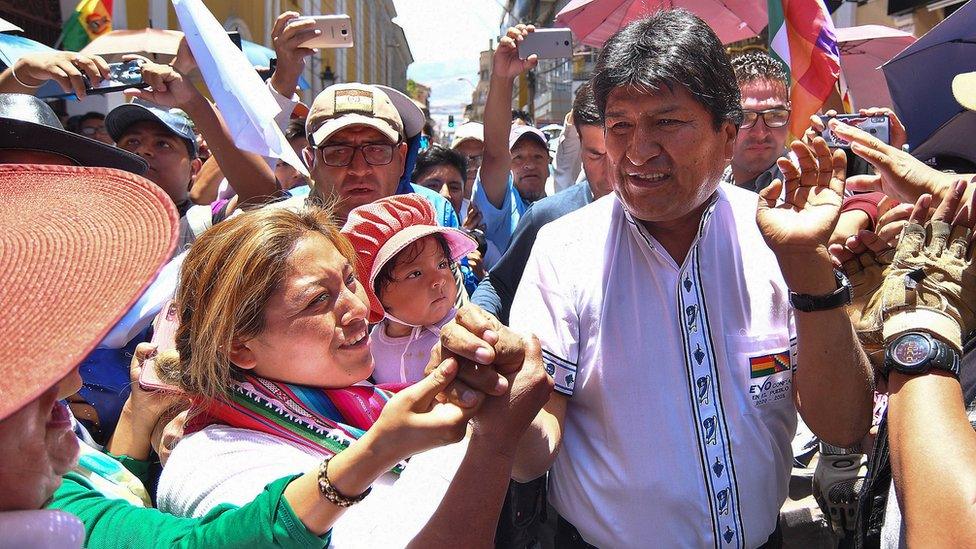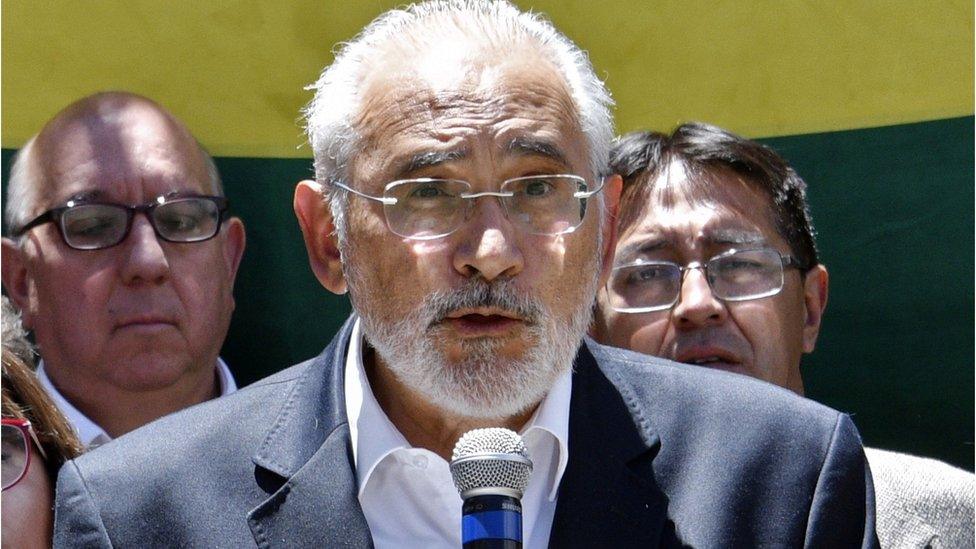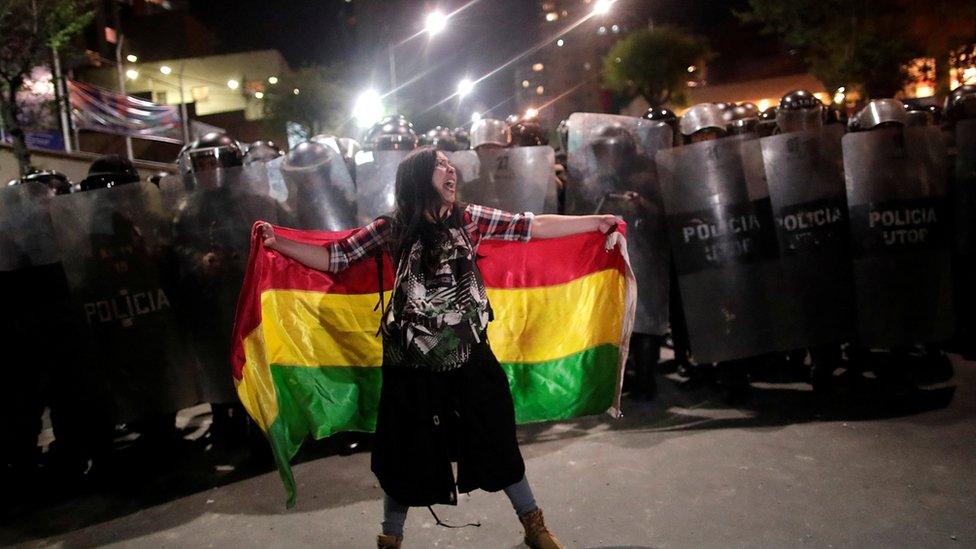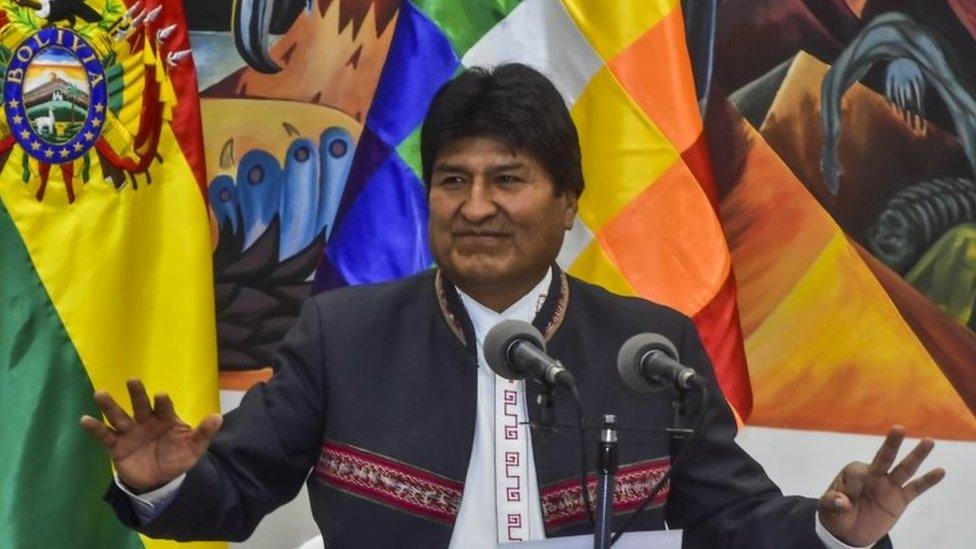Bolivia election: Protests as Evo Morales officially declared winner
- Published
Angry protesters chant in La Paz: "This isn't Cuba, neither Venezuela"
Bolivian President Evo Morales has been declared the winner of Sunday's election, despite disputed results that have sparked riots and claims of fraud.
Officials said Mr Morales had won 47.1% of the vote and beaten his closest rival by more than 10 percentage points, thereby avoiding a run-off.
Claims of vote-rigging were made after the count was interrupted for 24 hours.
Second-placed candidate Carlos Mesa has called for a second-round vote as have the US, Brazil, Argentina and Colombia.
But Mr Morales, Bolivia's first indigenous president and already Latin America's longest-serving leader, is now set to govern the country until 2025.
Police fired tear gas at crowds who protested by the thousands in the capital, La Paz. Clashes also broke out in Santa Cruz de la Sierra, the country's largest city and an opposition stronghold.
Many Bolivians say they no longer have confidence in the electoral authorities, and more protests are expected on Friday.
What does the result say?
According to the electoral tribunal, which said 99.9% of ballots had been counted, Mr Mesa has won 36.51% of the vote. This gives Mr Morales a winning margin of more than 10 percentage points, meaning that a second round of voting is not required under the election law.
The remaining 0.01% of votes were voided in the region of Beni, with new voting there scheduled for November. These votes would not be enough to change the outcome of the election, a spokeswoman for the electoral tribunal said.
In a video released after counting ended, Mr Mesa said: "What just happened minutes ago is something that we all expected. We knew how stubborn the president is."
Mr Mesa calculated that his chances of winning in a second round vote would be higher, especially if eliminated candidates threw their support behind him.
Why is the result controversial?
Hours after polling booths closed on Sunday, electoral officials released the first results of the quick count that suggested the race was close and a second-round vote would need to be held.
The official website then stopped updating for 24 hours. When it finally resumed, Mr Morales had a lead of more than 10 percentage points.

Mr Morales, seen here with supporters in Cochabamba, has rejected the accusations of fraud
On Thursday evening, the head of the Organization of American States (OAS), Luis Almagro, said Bolivia had to wait for an audit by the regional bloc before declaring the results.
OAS observers expressed concern over the count's dramatic shift, and the European Union backed their assessment that a second round should be held "to restore trust and ensure the full respect of the democratic choice of the Bolivian people" .
But Mr Morales has ignored calls for a second-round vote and rejected criticism over the legitimacy of the election. He has also denied meddling in the vote, claiming the accusations are part of an opposition campaign to remove him from power.
The electoral tribunal has also denied claims by the opposition that it manipulated the count to help Mr Morales win.

Mr Mesa has called for a second round of voting
Protests have been held across the country since Monday, with electoral offices in Sucre and Potosi being torched. A general strike began on Wednesday, and Mr Mesa has urged his supporters to continue protest action.
What's the background?
Mr Morales, who came to power in 2006, is a divisive figure praised for his social policies but criticised for challenging presidential term limits. In a referendum in 2016, Bolivians rejected his suggestion to ditch the limits.
But his Movement for Socialism (Mas) party took the matter to the constitutional court, which ruled in the president's favour, allowing him to stand for a fourth term.
He had won all his previous terms in the election's first round and his insistence on running again angered many.
Despite the controversies, many indigenous Bolivians continue to back him, saying Mr Mesa - who ran for the Civic Community (Comunidad Ciudadana) political alliance - embodies the white Bolivian elite. They also question his commitment to the poor.
- Published22 October 2019

- Published24 October 2019
